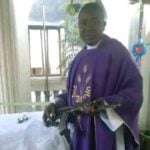Kemi Badenoch, leader of the United Kingdom’s Conservative Party, has claimed that she cannot pass her right of Nigerian citizenship to her children because of her gender.
Badenoch spoke on Sunday in an interview with CNN’s Fareed Zakaria, attempting to contrast the immigration policies of Nigeria and Britain.
In stressing her point, she claimed that Nigerians find it easier to secure a British citizenship than for foreigners to become Nigerian.
“It’s virtually impossible, for example, to get Nigerian citizenship. I have that citizenship by virtue of my parents, I can’t give it to my children because I’m a woman,” she said.
“Yet loads of Nigerians come to the UK and stay for a relatively free period of time, acquire British citizenship. We need to stop being naive.”
Badenoch’s claim stirred a flurry of reactions from Nigerians, with many criticising her over the authenticity of her claims.
Born in the UK to Nigerian Yoruba parents, Olukemi Adegoke was brought to Nigeria, where she spent much of her childhood before returning to the UK at age 16.
Before returning to the UK, she had her basic education in a private school in Lagos, Nigeria, without needing a student visa by virtue of being a Nigerian citizen.
Student visa (R7A) is a type of visa issued to international students for studying in Nigeria. Nigerian citizens are not deemed as international students and do not require a student visa to study within the country.
She later married Hamish Badenoch, a Scottish banker, and adopted his surname, becoming Kemi Badenoch.
The couple has three children.
VERIFICATION
CableCheck assessed Badenoch’s assertions against the provisions of the Nigerian Constitution.
According to section 25(1)(c) of the 1999 Constitution, a person born outside Nigeria is a citizen of Nigeria if either of their parents is a Nigerian citizen.
This means having just one Nigerian parent is sufficient for citizenship by birth. In Badenoch’s case, her children are automatically Nigerian citizens.
Citizenship by birth in Nigeria means acquiring Nigerian citizenship automatically at birth, based primarily on the citizenship status of one’s parents or grandparents, rather than solely on the place of birth.
This status grants the holder all the rights of citizenship, including the right to enter Nigeria freely and enjoy constitutional protections.
Nigerian law also allows dual citizenship, but with specific conditions.
Section 28(1) states that a person who is a Nigerian citizen by birth may acquire the citizenship of another country without losing their Nigerian citizenship.
However, a person who is not a Nigerian by birth who acquired citizenship by registration or naturalisation will forfeit their Nigerian citizenship if they acquire or retain the citizenship of another country.
In addition, the law does not restrict privileges of citizenship by birth to gender.
Gender becomes relevant only in cases involving foreign spouses.
Section 26(2)(a) of the Nigerian Constitution states, “any woman who is or has been married to a citizen of Nigeria” may become a citizen too.
Foreign men married to Nigerian women are not automatically eligible for citizenship by registration under this law; they may have to qualify by naturalisation, which has stricter requirements.
Thus, it would be difficult for Badenoch’s Scottish husband to be automatically granted citizenship. However, this does not apply to their children, who have a Nigerian mother and Nigerian grandparents.
ASHLEIGH PLUMPTRE: A CASE OF MIXED HERITAGE AND CITIZENSHIP
Ashleigh Plumptre, 27, is a professional British-Nigerian footballer.
Plumptre plays as a centre-back for Al-Ittihad, a Saudi Premier League club, and the Super Falcons, the Nigerian women’s national team.
Tim Plumptre, her father, is of Nigerian descent from Lagos, while her mother is English.
Ahead of the 2022 Women’s Africa Cup of Nations (WAFCON), Plumptre made a decision to represent Nigeria, her paternal heritage, over continuing with England.
In an interview this month, Tim said he consciously raised his daughter with an understanding of her heritage by taking her to spend time with Harry Dotun Plumptre, her grandfather, and as many of her extended Nigerian family as possible.
Plumptre is among the 24 Nigerian players currently competing for the 2025 WAFCON.
VERDICT
Badenoch’s claim that she cannot pass her Nigerian citizenship to her children is false. This would only be the case if she had revoked her citizenship.





